Sustainability Education in Early Childhood: Importance and Strategies
VerifiedAdded on 2022/09/15
|9
|2629
|48
Essay
AI Summary
This essay explores the vital role of sustainability education in early childhood care, emphasizing its impact on children's physical, emotional, and social development. It analyzes various perspectives on early childhood care, discusses pedagogical practices for implementing sustainable education, and examines effective teaching strategies for explaining sustainability to young children. The essay highlights the importance of fostering an eco-centric worldview in children, developing critical thinking skills, and promoting responsible behavior towards the environment. It also touches upon the role of educators in creating a sustainable learning environment and integrating sustainability into everyday practices. Ultimately, the essay argues that sustainability education in early childhood is essential for preparing children to be responsible and engaged citizens who can contribute to a more sustainable future.
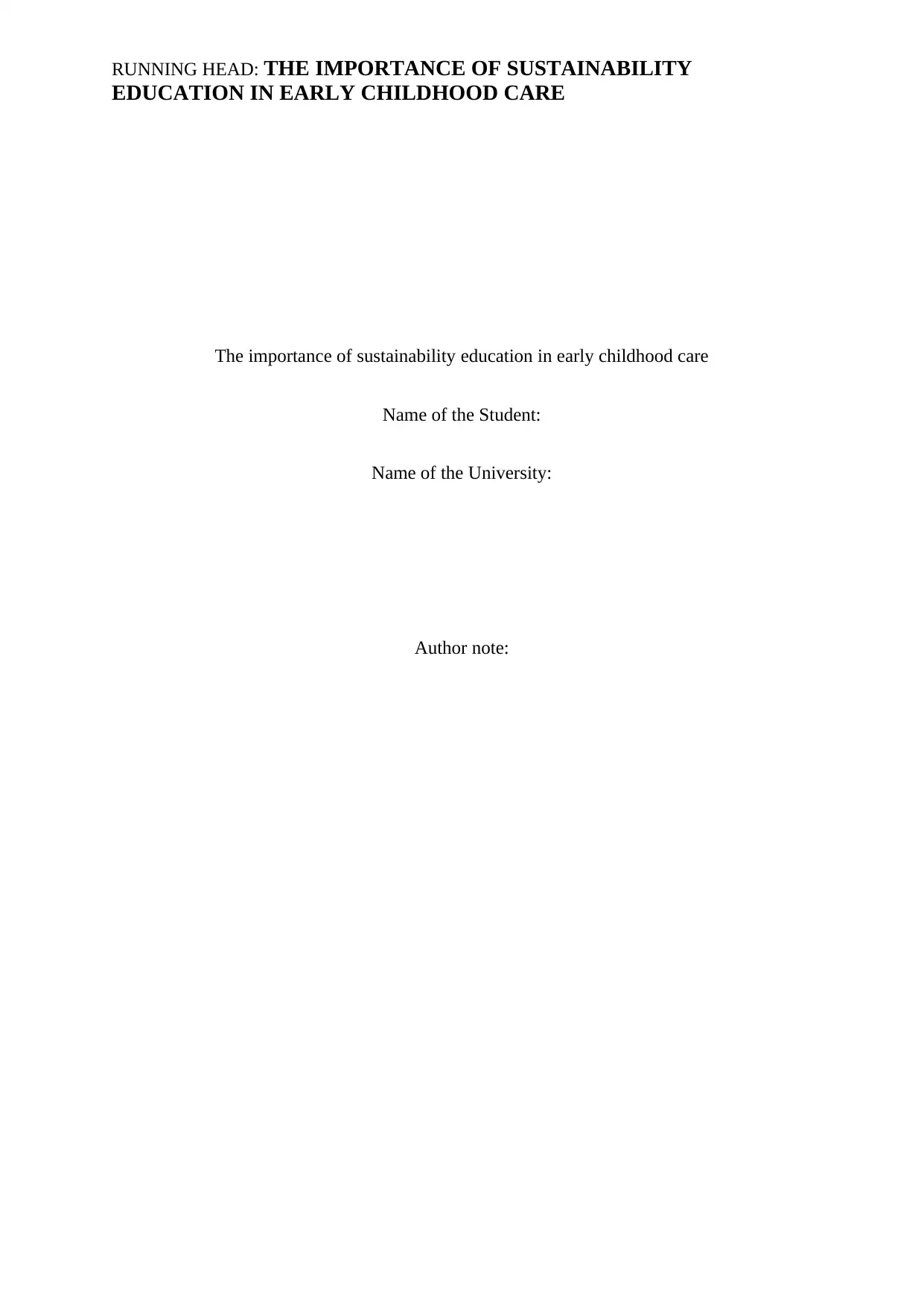
RUNNING HEAD: THE IMPORTANCE OF SUSTAINABILITY
EDUCATION IN EARLY CHILDHOOD CARE
The importance of sustainability education in early childhood care
Name of the Student:
Name of the University:
Author note:
EDUCATION IN EARLY CHILDHOOD CARE
The importance of sustainability education in early childhood care
Name of the Student:
Name of the University:
Author note:
Paraphrase This Document
Need a fresh take? Get an instant paraphrase of this document with our AI Paraphraser
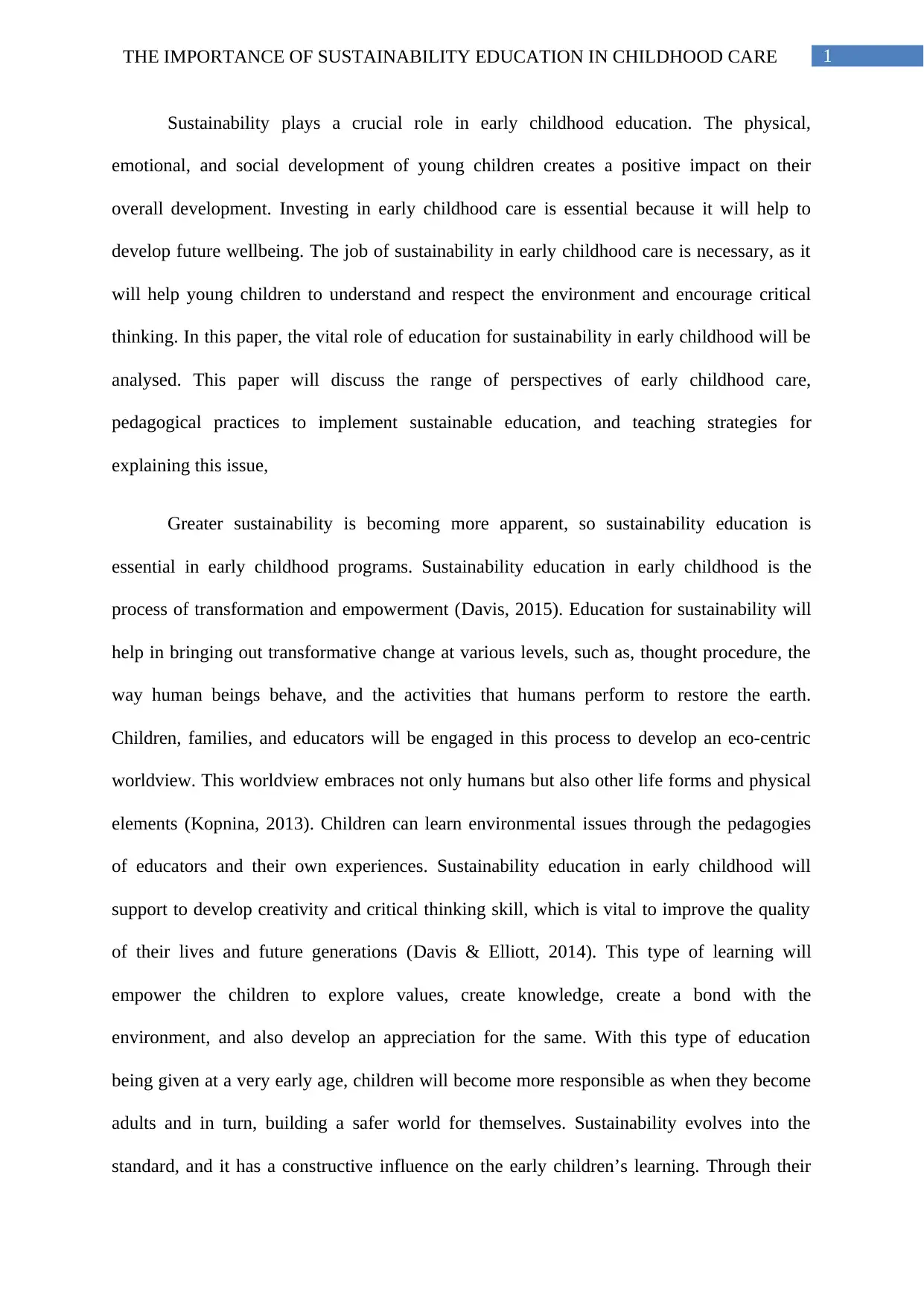
1THE IMPORTANCE OF SUSTAINABILITY EDUCATION IN CHILDHOOD CARE
Sustainability plays a crucial role in early childhood education. The physical,
emotional, and social development of young children creates a positive impact on their
overall development. Investing in early childhood care is essential because it will help to
develop future wellbeing. The job of sustainability in early childhood care is necessary, as it
will help young children to understand and respect the environment and encourage critical
thinking. In this paper, the vital role of education for sustainability in early childhood will be
analysed. This paper will discuss the range of perspectives of early childhood care,
pedagogical practices to implement sustainable education, and teaching strategies for
explaining this issue,
Greater sustainability is becoming more apparent, so sustainability education is
essential in early childhood programs. Sustainability education in early childhood is the
process of transformation and empowerment (Davis, 2015). Education for sustainability will
help in bringing out transformative change at various levels, such as, thought procedure, the
way human beings behave, and the activities that humans perform to restore the earth.
Children, families, and educators will be engaged in this process to develop an eco-centric
worldview. This worldview embraces not only humans but also other life forms and physical
elements (Kopnina, 2013). Children can learn environmental issues through the pedagogies
of educators and their own experiences. Sustainability education in early childhood will
support to develop creativity and critical thinking skill, which is vital to improve the quality
of their lives and future generations (Davis & Elliott, 2014). This type of learning will
empower the children to explore values, create knowledge, create a bond with the
environment, and also develop an appreciation for the same. With this type of education
being given at a very early age, children will become more responsible as when they become
adults and in turn, building a safer world for themselves. Sustainability evolves into the
standard, and it has a constructive influence on the early children’s learning. Through their
Sustainability plays a crucial role in early childhood education. The physical,
emotional, and social development of young children creates a positive impact on their
overall development. Investing in early childhood care is essential because it will help to
develop future wellbeing. The job of sustainability in early childhood care is necessary, as it
will help young children to understand and respect the environment and encourage critical
thinking. In this paper, the vital role of education for sustainability in early childhood will be
analysed. This paper will discuss the range of perspectives of early childhood care,
pedagogical practices to implement sustainable education, and teaching strategies for
explaining this issue,
Greater sustainability is becoming more apparent, so sustainability education is
essential in early childhood programs. Sustainability education in early childhood is the
process of transformation and empowerment (Davis, 2015). Education for sustainability will
help in bringing out transformative change at various levels, such as, thought procedure, the
way human beings behave, and the activities that humans perform to restore the earth.
Children, families, and educators will be engaged in this process to develop an eco-centric
worldview. This worldview embraces not only humans but also other life forms and physical
elements (Kopnina, 2013). Children can learn environmental issues through the pedagogies
of educators and their own experiences. Sustainability education in early childhood will
support to develop creativity and critical thinking skill, which is vital to improve the quality
of their lives and future generations (Davis & Elliott, 2014). This type of learning will
empower the children to explore values, create knowledge, create a bond with the
environment, and also develop an appreciation for the same. With this type of education
being given at a very early age, children will become more responsible as when they become
adults and in turn, building a safer world for themselves. Sustainability evolves into the
standard, and it has a constructive influence on the early children’s learning. Through their
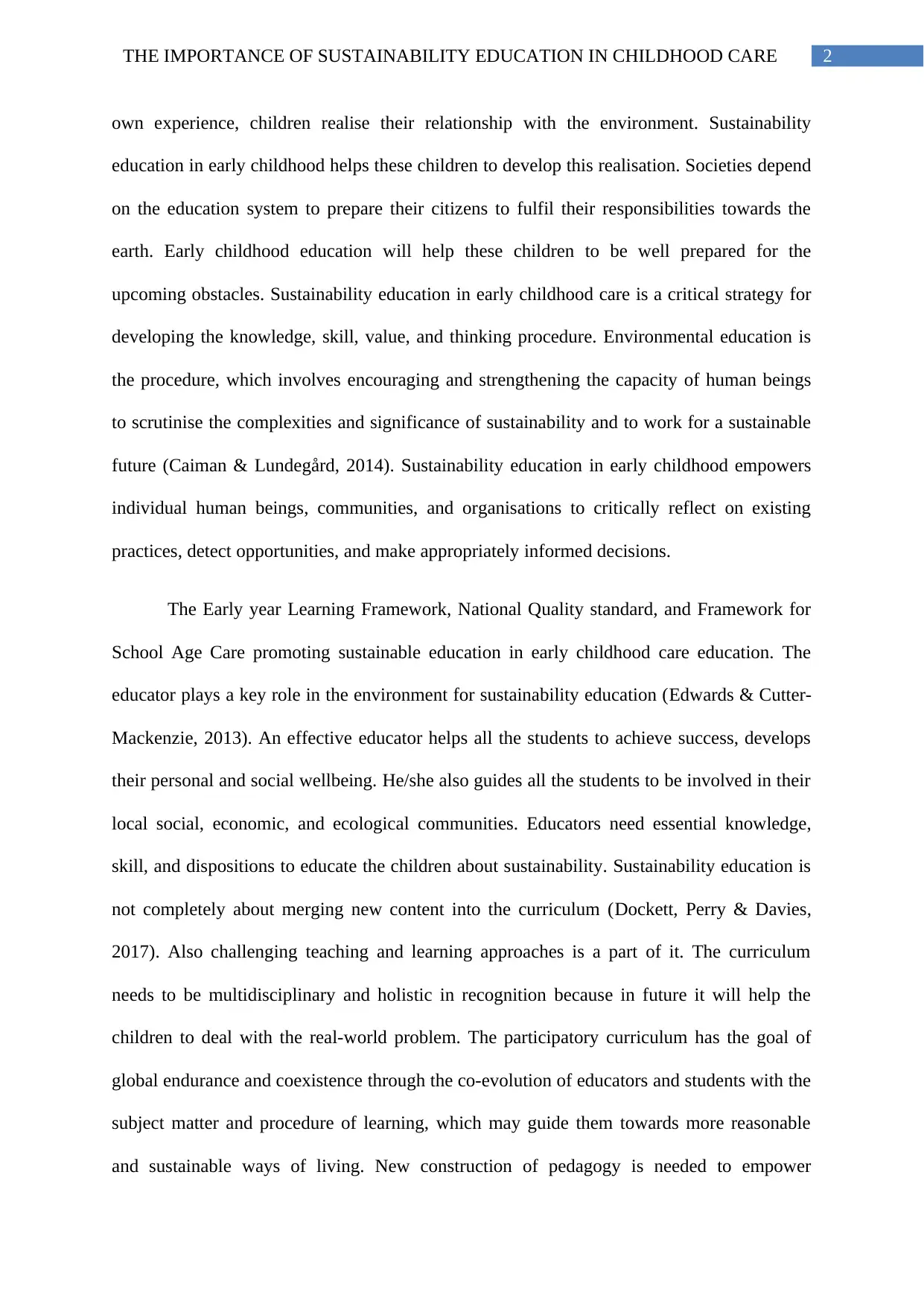
2THE IMPORTANCE OF SUSTAINABILITY EDUCATION IN CHILDHOOD CARE
own experience, children realise their relationship with the environment. Sustainability
education in early childhood helps these children to develop this realisation. Societies depend
on the education system to prepare their citizens to fulfil their responsibilities towards the
earth. Early childhood education will help these children to be well prepared for the
upcoming obstacles. Sustainability education in early childhood care is a critical strategy for
developing the knowledge, skill, value, and thinking procedure. Environmental education is
the procedure, which involves encouraging and strengthening the capacity of human beings
to scrutinise the complexities and significance of sustainability and to work for a sustainable
future (Caiman & Lundegård, 2014). Sustainability education in early childhood empowers
individual human beings, communities, and organisations to critically reflect on existing
practices, detect opportunities, and make appropriately informed decisions.
The Early year Learning Framework, National Quality standard, and Framework for
School Age Care promoting sustainable education in early childhood care education. The
educator plays a key role in the environment for sustainability education (Edwards & Cutter-
Mackenzie, 2013). An effective educator helps all the students to achieve success, develops
their personal and social wellbeing. He/she also guides all the students to be involved in their
local social, economic, and ecological communities. Educators need essential knowledge,
skill, and dispositions to educate the children about sustainability. Sustainability education is
not completely about merging new content into the curriculum (Dockett, Perry & Davies,
2017). Also challenging teaching and learning approaches is a part of it. The curriculum
needs to be multidisciplinary and holistic in recognition because in future it will help the
children to deal with the real-world problem. The participatory curriculum has the goal of
global endurance and coexistence through the co-evolution of educators and students with the
subject matter and procedure of learning, which may guide them towards more reasonable
and sustainable ways of living. New construction of pedagogy is needed to empower
own experience, children realise their relationship with the environment. Sustainability
education in early childhood helps these children to develop this realisation. Societies depend
on the education system to prepare their citizens to fulfil their responsibilities towards the
earth. Early childhood education will help these children to be well prepared for the
upcoming obstacles. Sustainability education in early childhood care is a critical strategy for
developing the knowledge, skill, value, and thinking procedure. Environmental education is
the procedure, which involves encouraging and strengthening the capacity of human beings
to scrutinise the complexities and significance of sustainability and to work for a sustainable
future (Caiman & Lundegård, 2014). Sustainability education in early childhood empowers
individual human beings, communities, and organisations to critically reflect on existing
practices, detect opportunities, and make appropriately informed decisions.
The Early year Learning Framework, National Quality standard, and Framework for
School Age Care promoting sustainable education in early childhood care education. The
educator plays a key role in the environment for sustainability education (Edwards & Cutter-
Mackenzie, 2013). An effective educator helps all the students to achieve success, develops
their personal and social wellbeing. He/she also guides all the students to be involved in their
local social, economic, and ecological communities. Educators need essential knowledge,
skill, and dispositions to educate the children about sustainability. Sustainability education is
not completely about merging new content into the curriculum (Dockett, Perry & Davies,
2017). Also challenging teaching and learning approaches is a part of it. The curriculum
needs to be multidisciplinary and holistic in recognition because in future it will help the
children to deal with the real-world problem. The participatory curriculum has the goal of
global endurance and coexistence through the co-evolution of educators and students with the
subject matter and procedure of learning, which may guide them towards more reasonable
and sustainable ways of living. New construction of pedagogy is needed to empower
⊘ This is a preview!⊘
Do you want full access?
Subscribe today to unlock all pages.

Trusted by 1+ million students worldwide
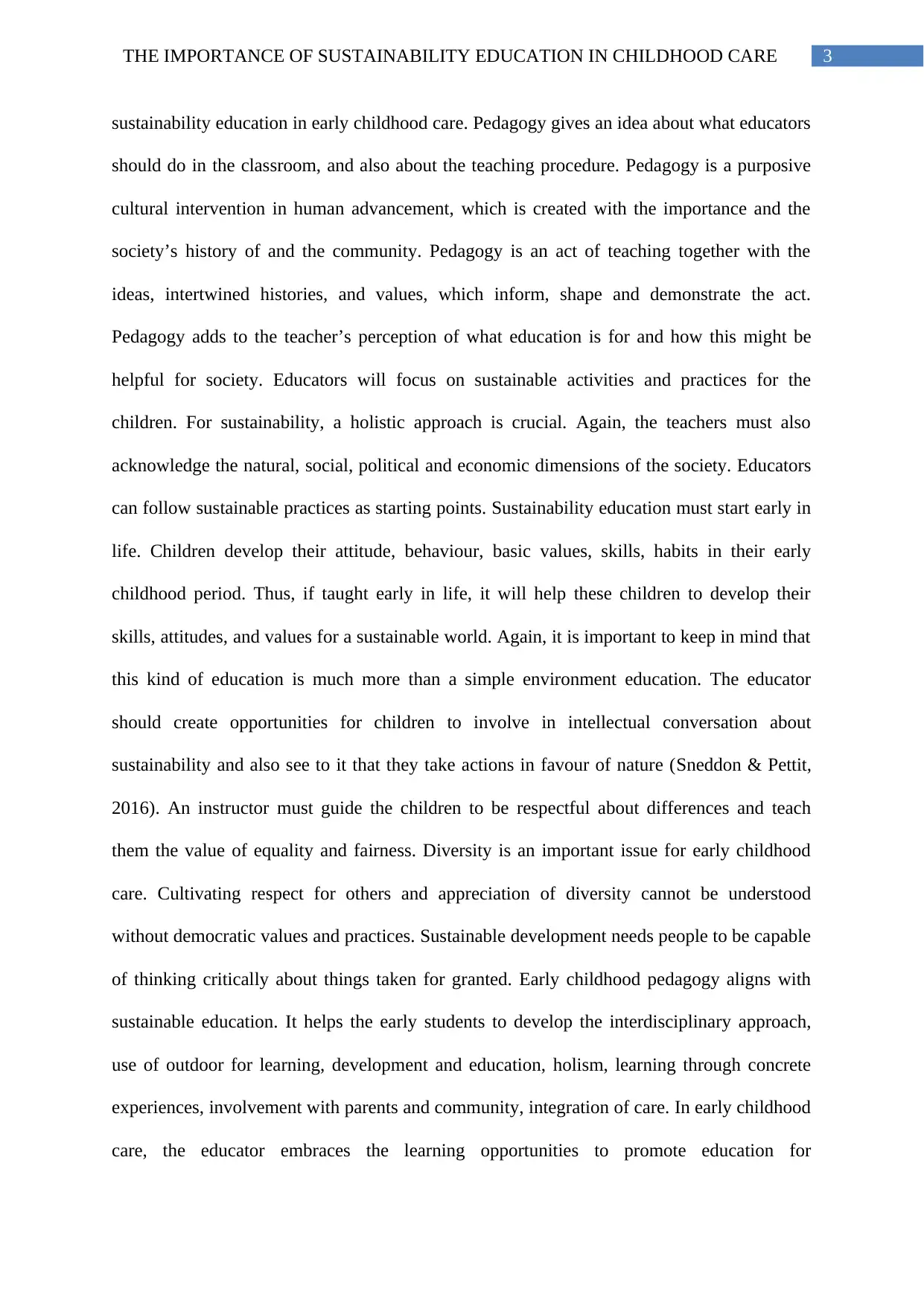
3THE IMPORTANCE OF SUSTAINABILITY EDUCATION IN CHILDHOOD CARE
sustainability education in early childhood care. Pedagogy gives an idea about what educators
should do in the classroom, and also about the teaching procedure. Pedagogy is a purposive
cultural intervention in human advancement, which is created with the importance and the
society’s history of and the community. Pedagogy is an act of teaching together with the
ideas, intertwined histories, and values, which inform, shape and demonstrate the act.
Pedagogy adds to the teacher’s perception of what education is for and how this might be
helpful for society. Educators will focus on sustainable activities and practices for the
children. For sustainability, a holistic approach is crucial. Again, the teachers must also
acknowledge the natural, social, political and economic dimensions of the society. Educators
can follow sustainable practices as starting points. Sustainability education must start early in
life. Children develop their attitude, behaviour, basic values, skills, habits in their early
childhood period. Thus, if taught early in life, it will help these children to develop their
skills, attitudes, and values for a sustainable world. Again, it is important to keep in mind that
this kind of education is much more than a simple environment education. The educator
should create opportunities for children to involve in intellectual conversation about
sustainability and also see to it that they take actions in favour of nature (Sneddon & Pettit,
2016). An instructor must guide the children to be respectful about differences and teach
them the value of equality and fairness. Diversity is an important issue for early childhood
care. Cultivating respect for others and appreciation of diversity cannot be understood
without democratic values and practices. Sustainable development needs people to be capable
of thinking critically about things taken for granted. Early childhood pedagogy aligns with
sustainable education. It helps the early students to develop the interdisciplinary approach,
use of outdoor for learning, development and education, holism, learning through concrete
experiences, involvement with parents and community, integration of care. In early childhood
care, the educator embraces the learning opportunities to promote education for
sustainability education in early childhood care. Pedagogy gives an idea about what educators
should do in the classroom, and also about the teaching procedure. Pedagogy is a purposive
cultural intervention in human advancement, which is created with the importance and the
society’s history of and the community. Pedagogy is an act of teaching together with the
ideas, intertwined histories, and values, which inform, shape and demonstrate the act.
Pedagogy adds to the teacher’s perception of what education is for and how this might be
helpful for society. Educators will focus on sustainable activities and practices for the
children. For sustainability, a holistic approach is crucial. Again, the teachers must also
acknowledge the natural, social, political and economic dimensions of the society. Educators
can follow sustainable practices as starting points. Sustainability education must start early in
life. Children develop their attitude, behaviour, basic values, skills, habits in their early
childhood period. Thus, if taught early in life, it will help these children to develop their
skills, attitudes, and values for a sustainable world. Again, it is important to keep in mind that
this kind of education is much more than a simple environment education. The educator
should create opportunities for children to involve in intellectual conversation about
sustainability and also see to it that they take actions in favour of nature (Sneddon & Pettit,
2016). An instructor must guide the children to be respectful about differences and teach
them the value of equality and fairness. Diversity is an important issue for early childhood
care. Cultivating respect for others and appreciation of diversity cannot be understood
without democratic values and practices. Sustainable development needs people to be capable
of thinking critically about things taken for granted. Early childhood pedagogy aligns with
sustainable education. It helps the early students to develop the interdisciplinary approach,
use of outdoor for learning, development and education, holism, learning through concrete
experiences, involvement with parents and community, integration of care. In early childhood
care, the educator embraces the learning opportunities to promote education for
Paraphrase This Document
Need a fresh take? Get an instant paraphrase of this document with our AI Paraphraser
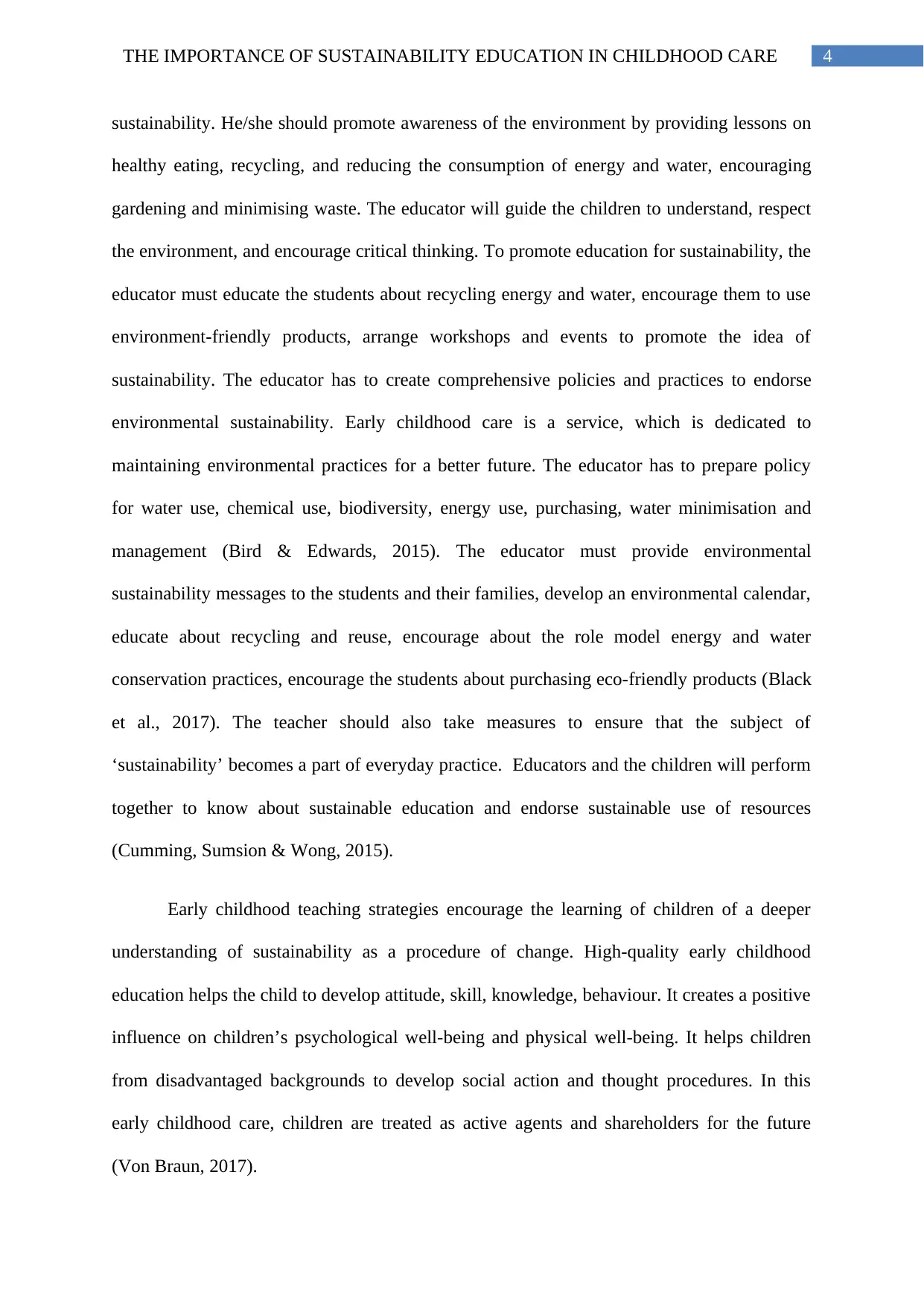
4THE IMPORTANCE OF SUSTAINABILITY EDUCATION IN CHILDHOOD CARE
sustainability. He/she should promote awareness of the environment by providing lessons on
healthy eating, recycling, and reducing the consumption of energy and water, encouraging
gardening and minimising waste. The educator will guide the children to understand, respect
the environment, and encourage critical thinking. To promote education for sustainability, the
educator must educate the students about recycling energy and water, encourage them to use
environment-friendly products, arrange workshops and events to promote the idea of
sustainability. The educator has to create comprehensive policies and practices to endorse
environmental sustainability. Early childhood care is a service, which is dedicated to
maintaining environmental practices for a better future. The educator has to prepare policy
for water use, chemical use, biodiversity, energy use, purchasing, water minimisation and
management (Bird & Edwards, 2015). The educator must provide environmental
sustainability messages to the students and their families, develop an environmental calendar,
educate about recycling and reuse, encourage about the role model energy and water
conservation practices, encourage the students about purchasing eco-friendly products (Black
et al., 2017). The teacher should also take measures to ensure that the subject of
‘sustainability’ becomes a part of everyday practice. Educators and the children will perform
together to know about sustainable education and endorse sustainable use of resources
(Cumming, Sumsion & Wong, 2015).
Early childhood teaching strategies encourage the learning of children of a deeper
understanding of sustainability as a procedure of change. High-quality early childhood
education helps the child to develop attitude, skill, knowledge, behaviour. It creates a positive
influence on children’s psychological well-being and physical well-being. It helps children
from disadvantaged backgrounds to develop social action and thought procedures. In this
early childhood care, children are treated as active agents and shareholders for the future
(Von Braun, 2017).
sustainability. He/she should promote awareness of the environment by providing lessons on
healthy eating, recycling, and reducing the consumption of energy and water, encouraging
gardening and minimising waste. The educator will guide the children to understand, respect
the environment, and encourage critical thinking. To promote education for sustainability, the
educator must educate the students about recycling energy and water, encourage them to use
environment-friendly products, arrange workshops and events to promote the idea of
sustainability. The educator has to create comprehensive policies and practices to endorse
environmental sustainability. Early childhood care is a service, which is dedicated to
maintaining environmental practices for a better future. The educator has to prepare policy
for water use, chemical use, biodiversity, energy use, purchasing, water minimisation and
management (Bird & Edwards, 2015). The educator must provide environmental
sustainability messages to the students and their families, develop an environmental calendar,
educate about recycling and reuse, encourage about the role model energy and water
conservation practices, encourage the students about purchasing eco-friendly products (Black
et al., 2017). The teacher should also take measures to ensure that the subject of
‘sustainability’ becomes a part of everyday practice. Educators and the children will perform
together to know about sustainable education and endorse sustainable use of resources
(Cumming, Sumsion & Wong, 2015).
Early childhood teaching strategies encourage the learning of children of a deeper
understanding of sustainability as a procedure of change. High-quality early childhood
education helps the child to develop attitude, skill, knowledge, behaviour. It creates a positive
influence on children’s psychological well-being and physical well-being. It helps children
from disadvantaged backgrounds to develop social action and thought procedures. In this
early childhood care, children are treated as active agents and shareholders for the future
(Von Braun, 2017).
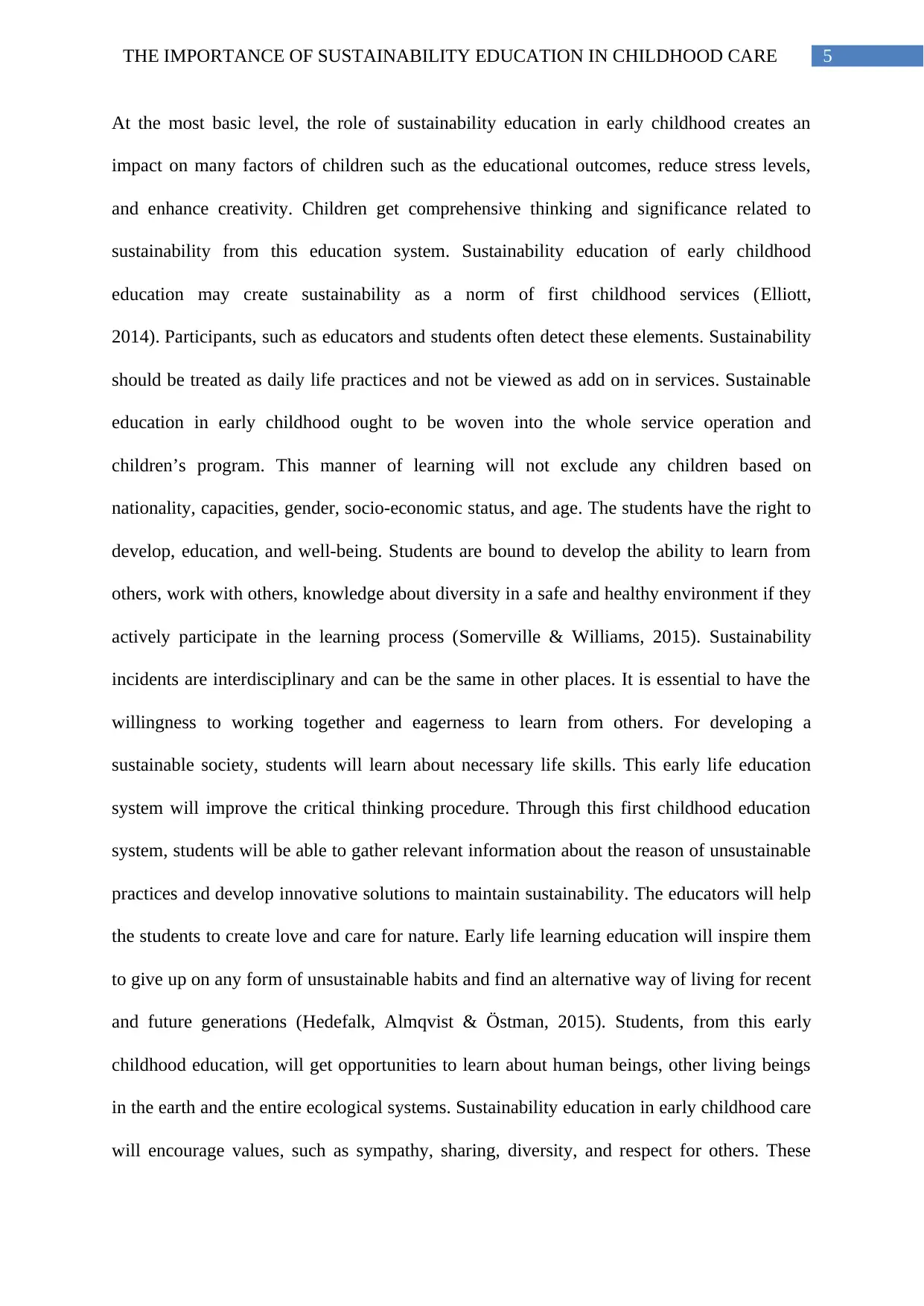
5THE IMPORTANCE OF SUSTAINABILITY EDUCATION IN CHILDHOOD CARE
At the most basic level, the role of sustainability education in early childhood creates an
impact on many factors of children such as the educational outcomes, reduce stress levels,
and enhance creativity. Children get comprehensive thinking and significance related to
sustainability from this education system. Sustainability education of early childhood
education may create sustainability as a norm of first childhood services (Elliott,
2014). Participants, such as educators and students often detect these elements. Sustainability
should be treated as daily life practices and not be viewed as add on in services. Sustainable
education in early childhood ought to be woven into the whole service operation and
children’s program. This manner of learning will not exclude any children based on
nationality, capacities, gender, socio-economic status, and age. The students have the right to
develop, education, and well-being. Students are bound to develop the ability to learn from
others, work with others, knowledge about diversity in a safe and healthy environment if they
actively participate in the learning process (Somerville & Williams, 2015). Sustainability
incidents are interdisciplinary and can be the same in other places. It is essential to have the
willingness to working together and eagerness to learn from others. For developing a
sustainable society, students will learn about necessary life skills. This early life education
system will improve the critical thinking procedure. Through this first childhood education
system, students will be able to gather relevant information about the reason of unsustainable
practices and develop innovative solutions to maintain sustainability. The educators will help
the students to create love and care for nature. Early life learning education will inspire them
to give up on any form of unsustainable habits and find an alternative way of living for recent
and future generations (Hedefalk, Almqvist & Östman, 2015). Students, from this early
childhood education, will get opportunities to learn about human beings, other living beings
in the earth and the entire ecological systems. Sustainability education in early childhood care
will encourage values, such as sympathy, sharing, diversity, and respect for others. These
At the most basic level, the role of sustainability education in early childhood creates an
impact on many factors of children such as the educational outcomes, reduce stress levels,
and enhance creativity. Children get comprehensive thinking and significance related to
sustainability from this education system. Sustainability education of early childhood
education may create sustainability as a norm of first childhood services (Elliott,
2014). Participants, such as educators and students often detect these elements. Sustainability
should be treated as daily life practices and not be viewed as add on in services. Sustainable
education in early childhood ought to be woven into the whole service operation and
children’s program. This manner of learning will not exclude any children based on
nationality, capacities, gender, socio-economic status, and age. The students have the right to
develop, education, and well-being. Students are bound to develop the ability to learn from
others, work with others, knowledge about diversity in a safe and healthy environment if they
actively participate in the learning process (Somerville & Williams, 2015). Sustainability
incidents are interdisciplinary and can be the same in other places. It is essential to have the
willingness to working together and eagerness to learn from others. For developing a
sustainable society, students will learn about necessary life skills. This early life education
system will improve the critical thinking procedure. Through this first childhood education
system, students will be able to gather relevant information about the reason of unsustainable
practices and develop innovative solutions to maintain sustainability. The educators will help
the students to create love and care for nature. Early life learning education will inspire them
to give up on any form of unsustainable habits and find an alternative way of living for recent
and future generations (Hedefalk, Almqvist & Östman, 2015). Students, from this early
childhood education, will get opportunities to learn about human beings, other living beings
in the earth and the entire ecological systems. Sustainability education in early childhood care
will encourage values, such as sympathy, sharing, diversity, and respect for others. These
⊘ This is a preview!⊘
Do you want full access?
Subscribe today to unlock all pages.

Trusted by 1+ million students worldwide
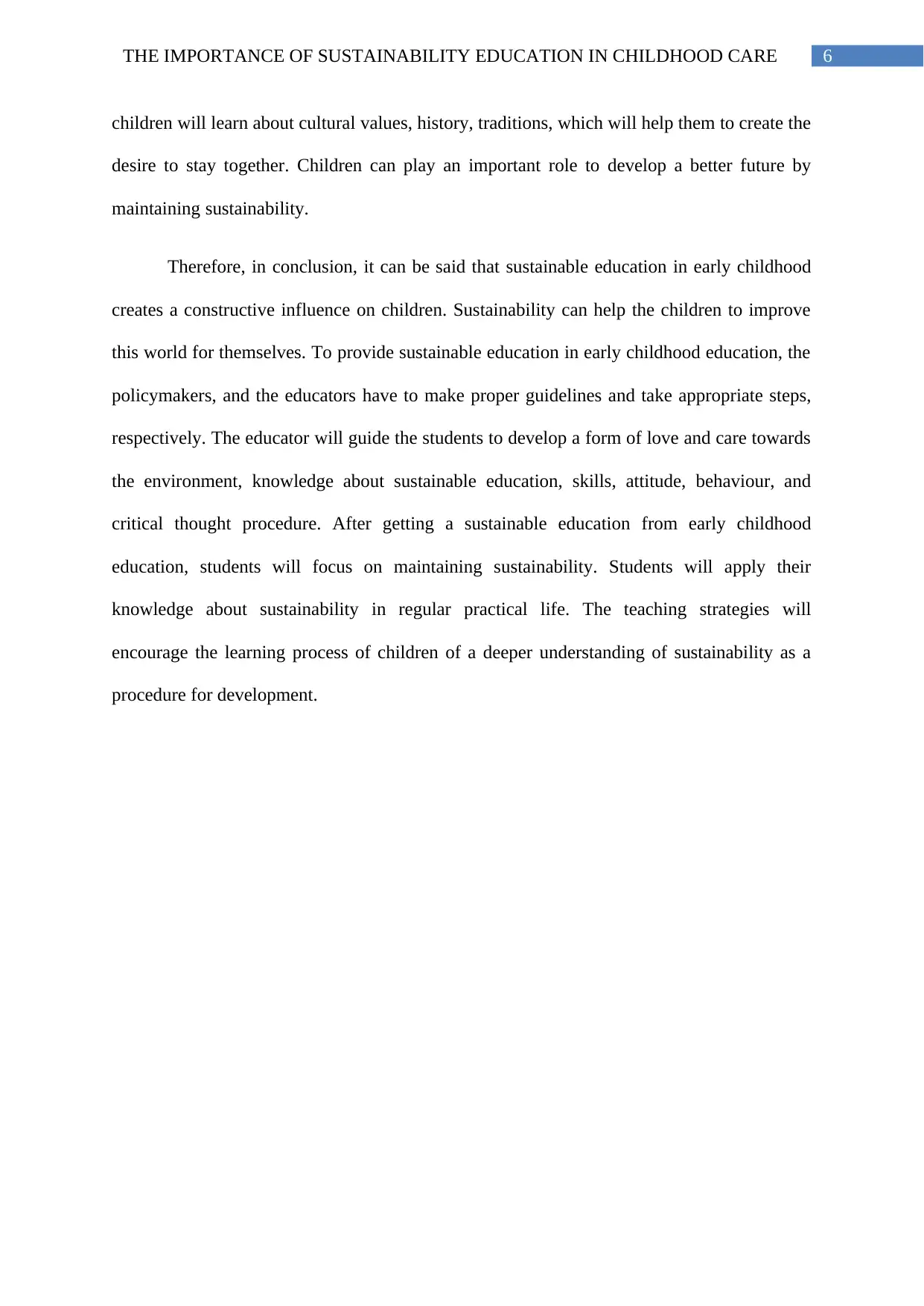
6THE IMPORTANCE OF SUSTAINABILITY EDUCATION IN CHILDHOOD CARE
children will learn about cultural values, history, traditions, which will help them to create the
desire to stay together. Children can play an important role to develop a better future by
maintaining sustainability.
Therefore, in conclusion, it can be said that sustainable education in early childhood
creates a constructive influence on children. Sustainability can help the children to improve
this world for themselves. To provide sustainable education in early childhood education, the
policymakers, and the educators have to make proper guidelines and take appropriate steps,
respectively. The educator will guide the students to develop a form of love and care towards
the environment, knowledge about sustainable education, skills, attitude, behaviour, and
critical thought procedure. After getting a sustainable education from early childhood
education, students will focus on maintaining sustainability. Students will apply their
knowledge about sustainability in regular practical life. The teaching strategies will
encourage the learning process of children of a deeper understanding of sustainability as a
procedure for development.
children will learn about cultural values, history, traditions, which will help them to create the
desire to stay together. Children can play an important role to develop a better future by
maintaining sustainability.
Therefore, in conclusion, it can be said that sustainable education in early childhood
creates a constructive influence on children. Sustainability can help the children to improve
this world for themselves. To provide sustainable education in early childhood education, the
policymakers, and the educators have to make proper guidelines and take appropriate steps,
respectively. The educator will guide the students to develop a form of love and care towards
the environment, knowledge about sustainable education, skills, attitude, behaviour, and
critical thought procedure. After getting a sustainable education from early childhood
education, students will focus on maintaining sustainability. Students will apply their
knowledge about sustainability in regular practical life. The teaching strategies will
encourage the learning process of children of a deeper understanding of sustainability as a
procedure for development.
Paraphrase This Document
Need a fresh take? Get an instant paraphrase of this document with our AI Paraphraser
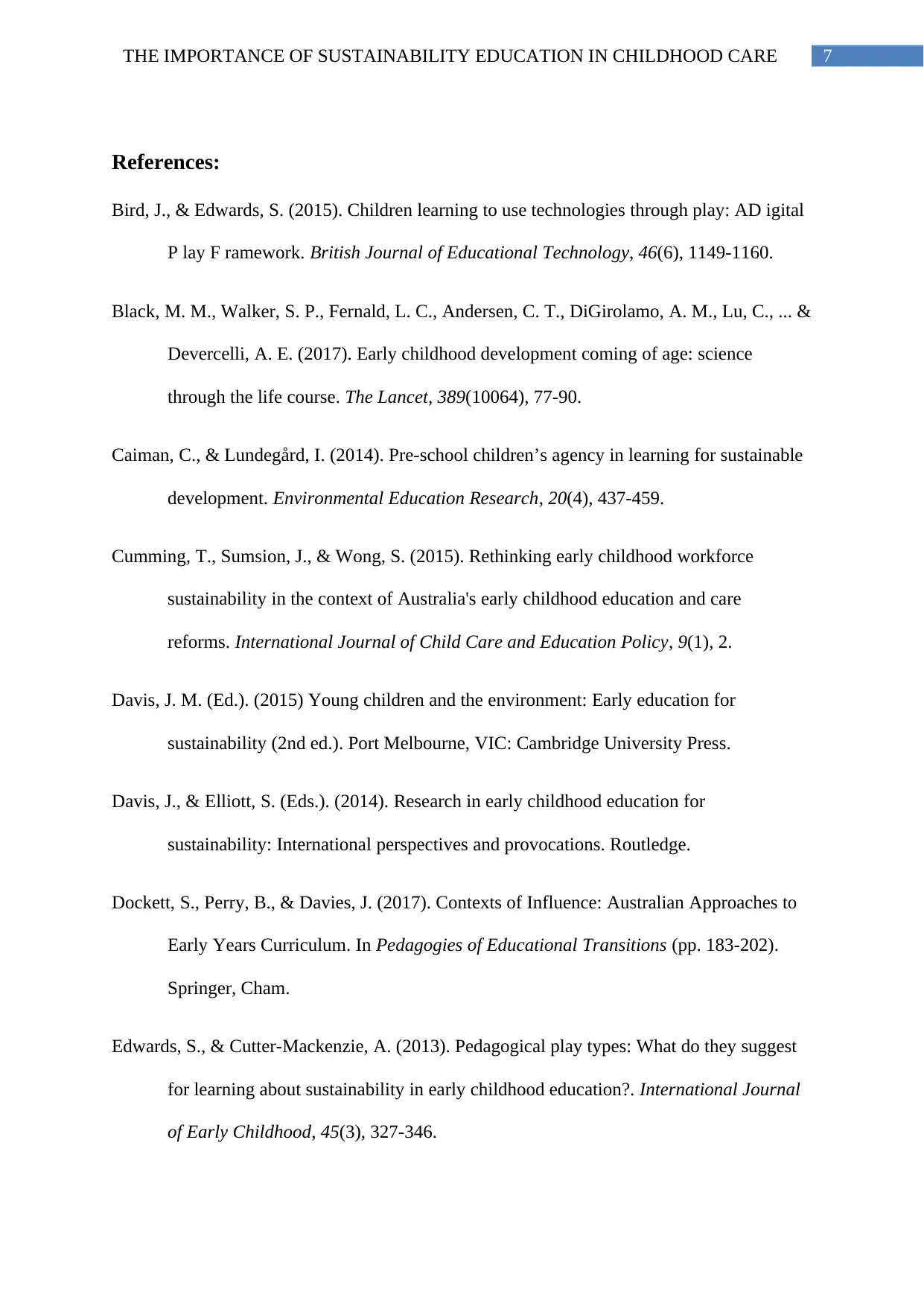
7THE IMPORTANCE OF SUSTAINABILITY EDUCATION IN CHILDHOOD CARE
References:
Bird, J., & Edwards, S. (2015). Children learning to use technologies through play: AD igital
P lay F ramework. British Journal of Educational Technology, 46(6), 1149-1160.
Black, M. M., Walker, S. P., Fernald, L. C., Andersen, C. T., DiGirolamo, A. M., Lu, C., ... &
Devercelli, A. E. (2017). Early childhood development coming of age: science
through the life course. The Lancet, 389(10064), 77-90.
Caiman, C., & Lundegård, I. (2014). Pre-school children’s agency in learning for sustainable
development. Environmental Education Research, 20(4), 437-459.
Cumming, T., Sumsion, J., & Wong, S. (2015). Rethinking early childhood workforce
sustainability in the context of Australia's early childhood education and care
reforms. International Journal of Child Care and Education Policy, 9(1), 2.
Davis, J. M. (Ed.). (2015) Young children and the environment: Early education for
sustainability (2nd ed.). Port Melbourne, VIC: Cambridge University Press.
Davis, J., & Elliott, S. (Eds.). (2014). Research in early childhood education for
sustainability: International perspectives and provocations. Routledge.
Dockett, S., Perry, B., & Davies, J. (2017). Contexts of Influence: Australian Approaches to
Early Years Curriculum. In Pedagogies of Educational Transitions (pp. 183-202).
Springer, Cham.
Edwards, S., & Cutter-Mackenzie, A. (2013). Pedagogical play types: What do they suggest
for learning about sustainability in early childhood education?. International Journal
of Early Childhood, 45(3), 327-346.
References:
Bird, J., & Edwards, S. (2015). Children learning to use technologies through play: AD igital
P lay F ramework. British Journal of Educational Technology, 46(6), 1149-1160.
Black, M. M., Walker, S. P., Fernald, L. C., Andersen, C. T., DiGirolamo, A. M., Lu, C., ... &
Devercelli, A. E. (2017). Early childhood development coming of age: science
through the life course. The Lancet, 389(10064), 77-90.
Caiman, C., & Lundegård, I. (2014). Pre-school children’s agency in learning for sustainable
development. Environmental Education Research, 20(4), 437-459.
Cumming, T., Sumsion, J., & Wong, S. (2015). Rethinking early childhood workforce
sustainability in the context of Australia's early childhood education and care
reforms. International Journal of Child Care and Education Policy, 9(1), 2.
Davis, J. M. (Ed.). (2015) Young children and the environment: Early education for
sustainability (2nd ed.). Port Melbourne, VIC: Cambridge University Press.
Davis, J., & Elliott, S. (Eds.). (2014). Research in early childhood education for
sustainability: International perspectives and provocations. Routledge.
Dockett, S., Perry, B., & Davies, J. (2017). Contexts of Influence: Australian Approaches to
Early Years Curriculum. In Pedagogies of Educational Transitions (pp. 183-202).
Springer, Cham.
Edwards, S., & Cutter-Mackenzie, A. (2013). Pedagogical play types: What do they suggest
for learning about sustainability in early childhood education?. International Journal
of Early Childhood, 45(3), 327-346.
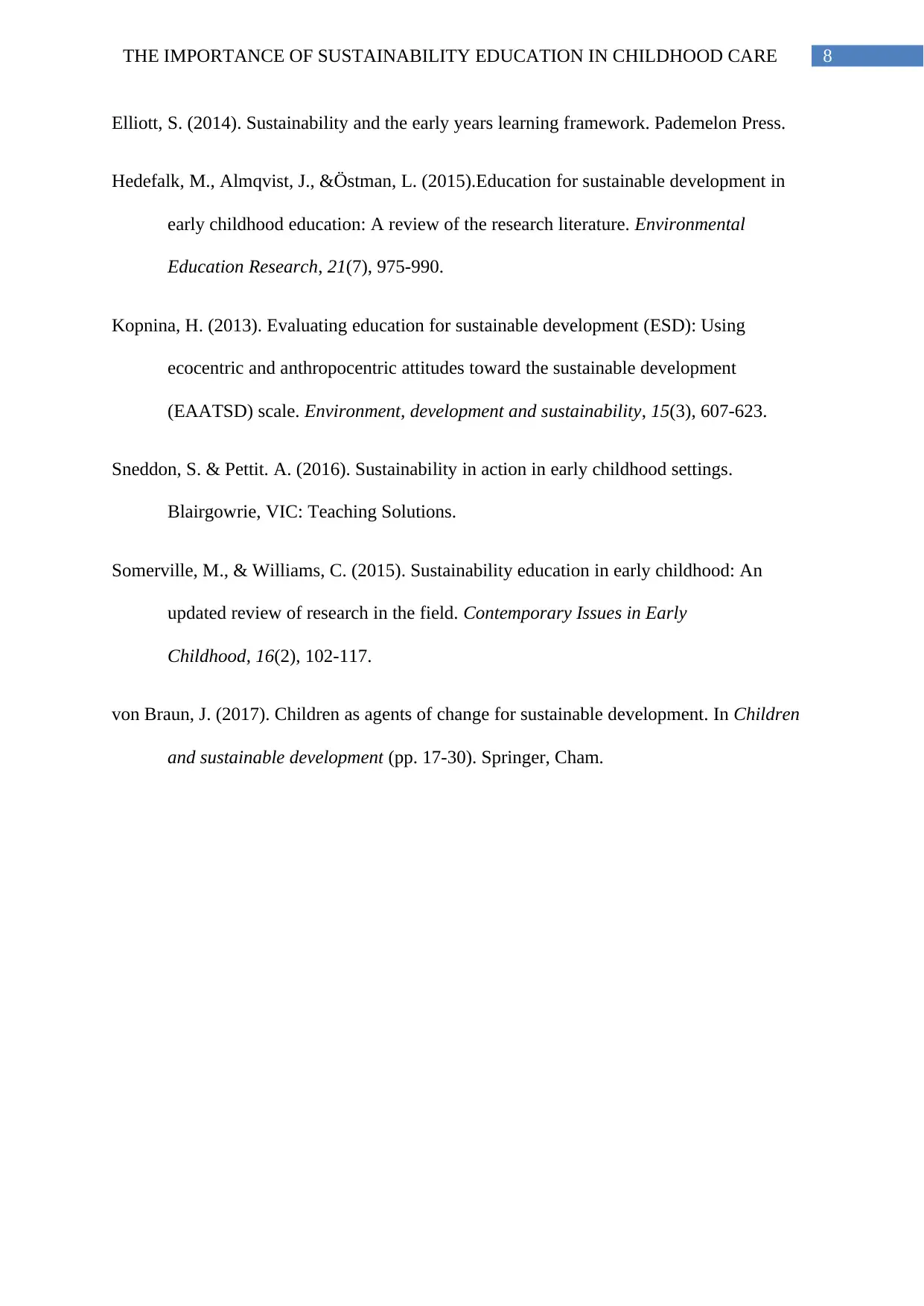
8THE IMPORTANCE OF SUSTAINABILITY EDUCATION IN CHILDHOOD CARE
Elliott, S. (2014). Sustainability and the early years learning framework. Pademelon Press.
Hedefalk, M., Almqvist, J., &Östman, L. (2015).Education for sustainable development in
early childhood education: A review of the research literature. Environmental
Education Research, 21(7), 975-990.
Kopnina, H. (2013). Evaluating education for sustainable development (ESD): Using
ecocentric and anthropocentric attitudes toward the sustainable development
(EAATSD) scale. Environment, development and sustainability, 15(3), 607-623.
Sneddon, S. & Pettit. A. (2016). Sustainability in action in early childhood settings.
Blairgowrie, VIC: Teaching Solutions.
Somerville, M., & Williams, C. (2015). Sustainability education in early childhood: An
updated review of research in the field. Contemporary Issues in Early
Childhood, 16(2), 102-117.
von Braun, J. (2017). Children as agents of change for sustainable development. In Children
and sustainable development (pp. 17-30). Springer, Cham.
Elliott, S. (2014). Sustainability and the early years learning framework. Pademelon Press.
Hedefalk, M., Almqvist, J., &Östman, L. (2015).Education for sustainable development in
early childhood education: A review of the research literature. Environmental
Education Research, 21(7), 975-990.
Kopnina, H. (2013). Evaluating education for sustainable development (ESD): Using
ecocentric and anthropocentric attitudes toward the sustainable development
(EAATSD) scale. Environment, development and sustainability, 15(3), 607-623.
Sneddon, S. & Pettit. A. (2016). Sustainability in action in early childhood settings.
Blairgowrie, VIC: Teaching Solutions.
Somerville, M., & Williams, C. (2015). Sustainability education in early childhood: An
updated review of research in the field. Contemporary Issues in Early
Childhood, 16(2), 102-117.
von Braun, J. (2017). Children as agents of change for sustainable development. In Children
and sustainable development (pp. 17-30). Springer, Cham.
⊘ This is a preview!⊘
Do you want full access?
Subscribe today to unlock all pages.

Trusted by 1+ million students worldwide
1 out of 9
Related Documents
Your All-in-One AI-Powered Toolkit for Academic Success.
+13062052269
info@desklib.com
Available 24*7 on WhatsApp / Email
![[object Object]](/_next/static/media/star-bottom.7253800d.svg)
Unlock your academic potential
Copyright © 2020–2026 A2Z Services. All Rights Reserved. Developed and managed by ZUCOL.





